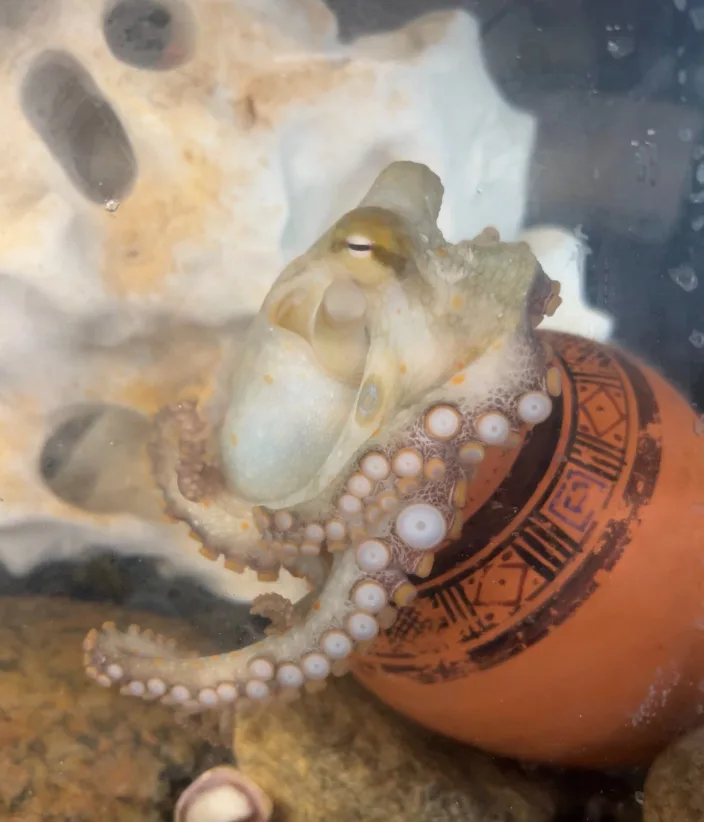Programs Blog
On Colonialism and Tourism in the Caribbean

27 September 2024
Falmouth, Massachusetts
Breezy, 65 degrees, partly cloudy, and a little humid
Hello, reader of the Coral Reef Conservation: Caribbean Sea Education Association Blog. My name is Leandro Nuckols, from Chicago, Illinois, in a neighborhood six blocks north of the meatpacking district. The smell permeates the air in my neighborhood and sticks to my clothes, skin, and nosehairs. I attend Grinnell College, where similar miasmatic conditions occur biweekly, when the confluence of methane and sulfurous compounds blow towards campus. The native landscape has been ransacked and replanted with corn and pigs. The experience of living and working in these two places brought me nothing but an urge to leave. I chose this program to escape the built environment of the US, and to instead experience the remarkable architecture of the natural world, as I’ve always loved marine ecosystems.
One aspect of my character is that I truly cannot do anything but live in the moment – brain fog from long Covid is quite a thick smoke, so being in an environment conducive to lucidity and presence means the world to me. If you’re having trouble fitting into the antiquated structure of either academia, city life, or the Midwest, I would highly advise signing up for one of SEA’s programs. I am incredibly grateful for the small classroom experience and absolution from the run-of-the-mill, neither-the-teacher-or-the-student-wants-to-be-here tedium of higher education. The only qualm I have with this campus is the fact that there are approximately $200 worth of dumbbells, ranging in weight from 3 to 25 pounds. But, ultimately, that’s not why I’m here.
I have some information to relay to you regarding the developments on this campus. For five weeks now myself and others have toiled away, learning about cultures and creatures previously unbeknownst to ourselves. I have found the topics of discussion thus far to be genuinely meaningful and pertinent to the successes of humanity as a collective. Although all empires are built on some degree of erasure, ranging in scale from genocide to systemic ignorance, educational nonprofits like SEA provide much-needed insights toward making life better for all. An inherently Marxist idea like protecting oceans and the people reliant on them wasn’t theorized until at least the 1970s. The political climate, and thus the investment climate of the time was narrowed in on self-defense, protection of capital, and the fear of nuclear war. In the meanwhile, carbon emissions were ramping up, and nobody cared to think about the ramifications until the Vietnam War, when environmental studies became a burgeoning field.
In Marine Environmental History, we learned about the history of the use of natural resources during the Industrial Revolution, specifically during sugar production in the colonial period of the Caribbean. The system by which European powers came to the Caribbean was built on a desire for extension of capital investments, at the cost of everything else. From the ridge to the reef, prices were placed on natural resources. Slaves were brought as free labor to work stolen lands into cash production sites via the plantation complex. Land once deemed productive was tarnished by endless planting and replanting of sugarcane. And once sugar stopped being profitable, colonies were relinquished to whichever political candidates emerged from the rubble.
The effects of the transition from colonial to postcolonial rule devastated island communities across the Caribbean, ceasing economic injections and causing the newly formed governments to rely on high-interest loans for things like infrastructure development. Economies became reliant on tourism, marketing their natural resources as idyllic tropical getaways with lavish beaches and bottomless margaritas. All the while, local people starved unless they worked within this system. Periods of connection between the land and local community were short lived. The rat-race of climbing the capitalist hierarchy replaced any notions of freedom, all while sea levels rose, coral reefs dissolved, and fish abundance decreased. I believe that education and acknowledgment of these issues can work to deconstruct the systems that keep people hungry and overworked.
Visiting St. Croix, Dominica, Barbados, and Anguilla will provide firsthand insights into the real effects of this system. I’m excited to talk to local people about the reality of living where they do. I look forward to spending the rest of my life fighting for the people subjugated by this continuous discriminatory economic allocation.
Thanks to my family, my friends, and SEA faculty for getting me this far. Thank you for reading this. Take time to think about your positionality and remember the best choice you can make is love.
Recent Posts from the Ships
- Ocean Classroom 2024-A collaborative high school program with Proctor Academy
- Collaborations and Long-term Commitments: SEA’s Caribbean Reef Program Sets a Course for Coastal Programs that Compliment Shipboard Experiences.
- Sea Education Association students prepare for life underway using state of the art nautical simulation from Wartsila Corporation.
- SEA Writer 2022, Magazines From the Summer SEA Quest Students
- Technology@SEA: Upgrades Allow Insight into Ocean Depths
Programs
- Gap Year
- Ocean Exploration
- High School
- Science at SEA
- SEA Expedition
- SEAScape
- Pre-College
- Proctor Ocean Classroom
- Protecting the Phoenix Islands
- SPICE
- Stanford@SEA
- Undergraduate
- Climate and Society
- Climate Change and Coastal Resilience
- Coral Reef Conservation
- Marine Biodiversity and Conservation
- MBL
- Ocean Exploration: Plastics
- Ocean Policy: Marine Protected Areas
- Oceans and Climate
- Pacific Reef Expedition
- The Global Ocean: Hawai'i
- The Global Ocean: New Zealand